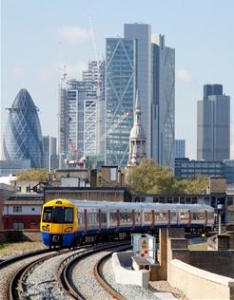Network Rail investigates independently powered electric trains

Network Rail and its partners have begun work to create a prototype battery-powered train, part of an industry study into the feasibility of using electric trains on parts of the network which have not been electrified.
This could see trains running on battery power over non-electrified lines, before charging at terminal stations, or using their batteries to run over diesel lines in otherwise electrified parts of the railway.
Electric trains are quicker, quieter, and more efficient - making them better for passengers and the environment. The potential to spread those benefits while not having to put up miles of wiring would be cost-effective and sustainable.
Network Rail’s director of network strategy and planning, Richard Eccles, said: “We see this project as an important element of our strategy of increasing the electrification of the rail network, delivering improved sustainability whilst reducing the burden on the taxpayer. If we can create an energy storage capability for trains, electric traction can be introduced to more parts of the network without the need to necessarily extend the electrification infrastructure.
“As the principle funder and delivery manager, we have done a great deal of feasibility work before reaching this stage, both to define the outputs we seek from the trial and to build confidence in the project across the industry. We are working with our partners to drive this innovation forward.”
ADVERTISEMENT
Funding is coming from Network Rail, the Enabling Innovation Team (hosted by the Rail Safety and Standards Board) and the Department for Transport.
David Clarke, Director, Enabling Innovation Team at RSSB said, “Energy storage on trains is a typical example of a development that’s good for passengers, taxpayers and the long term future of the railway but where it is difficult for individual businesses to make the business case to invest in the technology. To help prove the business case we are funding up to 30% of the technology demonstration.
“We see the IPEMU project as a good example of something that will work according to the R&D but no one will invest in without seeing a full scale demonstrator. By supporting this programme we are helping to take innovation out of the lab and de-risk its potential introduction onto the railway.”
Working closely with Derby-based train manufacturer Bombardier and operator Greater Anglia, the project will use one of the operator’s Class 379s as a test-bed to determine future battery requirements and what kind of train might be needed.
This train will be adapted by Bombardier and fitted with two different forms of batteries: lithium (iron magnesium) phosphate and hot sodium nickel salt. The batteries will undergo many lab tests before being fitted to the train.
Bombardier said: “We are very enthusiastic to be collaborating in this ground breaking project with Network Rail. This project is an innovative development to provide an integrated battery system as a power source for the well proven Electrostar train. Bombardier recognises the potential benefits that this technology could bring to the rail industry and the travelling public”
The modified 379 will then undergo a variety of tests ‘off network’, including the facility at Old Dalby. Should those tests prove successful, the train will then run on an electrified branch line on the Anglia route, yet to be chosen, with its pantograph down. This is so that if there is a problem, it can raise its pantograph, and collect power again. This running will be both in – and out of – passenger service.
Once the programme is complete, by the end of 2014, the unit will be returned to its former state and will run as a normal unit again in service.

